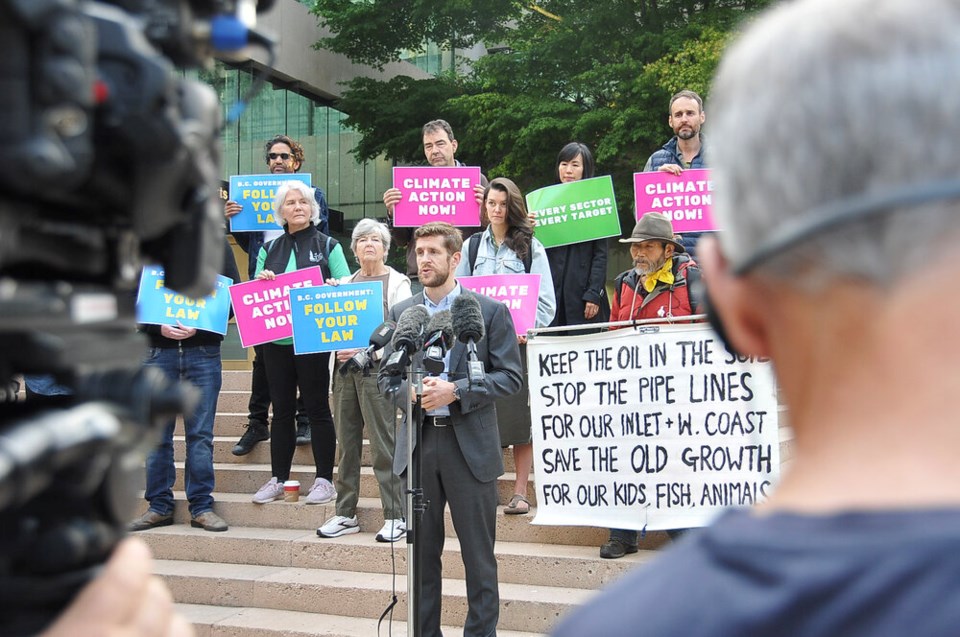B.C. voters are being left in the dark when it comes to how the provincial government is revealing its plans to reduce greenhouse gas emissions, claimed lawyers in a pivotal case heard Tuesday in a Vancouver Supreme Court.
The request for a , filed in March by the Sierra Club BC against the Ministry of Environment and Climate Change Strategy, turns on a key piece of legislation known as the Climate Accountability Act, which is meant to provide transparency around government emission reduction targets.
“This is just a vague plan to make a plan,” Sierra Club's lawyer Andhra Azevedo told Justice Jasvinder Basran in front of a full courtroom.
Last year, the ministry released plans to reduce emissions in the province to 40 per cent below 2007 levels by 2030. It said the province would achieve that goal through two climate plans: would get the province 40 per cent of the way there, and would make up the difference.
But lawyers for the environmental group argued the province has failed to do the same for its emission reduction targets in 2025, 2040 and 2050.
Instead, Azevedo said the ministry has essentially compiled a list of actions without explaining and justifying how those actions will move B.C. toward its GHG targets.
That matters, argued Azevedo, because B.C. has either missed or overturned every emissions reduction target it has set for itself.
Right now, Azevedo told the court a B.C. voter can only look to 2030 if they want to answer the most fundamental question: is B.C. on track to meet legislative targets?
“Essentially, they’re saying, ‘trust us,’” Azevedo said.
B.C. not explaining how it will lower oil and gas emissions, say lawyers
In a court filing, the Sierra Club lawyers also claim the B.C. government has failed to spell out how it will reach its 2030 emission reduction targets in the oil and gas sector.
While the 2030 Roadmap separates emission reduction targets for transportation and buildings, the plan combines emissions from industry and the oil and gas sector.
By not detailing future emissions from the oil and gas sector, the plan “undermines the intent to hit separate sectoral targets” and “makes it impossible to gauge what the minister is doing to reduce emissions,” said Azevedo.
That’s especially significant because emissions from oil and gas make up a large and potentially growing share of B.C.’s total emissions.
As an example, Azevedo pointed to LNG Canada, the largest natural gas project in the province. Set to begin operating in 2025, Azevedo said it’s expected to be in operation processing natural gas for several decades.
While emissions from LNG Canada may only make up seven per cent of the 2025 target, by 2050, B.C.’s shrinking carbon budget means it could end up accounting for up to 30 per cent of the province’s emissions.
“Decisions made now can lock in emissions, and will not just impact the ability to reach the 2030 target, but also those longer-term targets,” Azevedo told the court.
“And failing to take a close look at the reporting requirements will leave British Columbians in the dark about whether the province is about to miss another target.”
Ruling could have immediate and ‘practical impact’
Harry Wruck, senior council for the Sierra Club of BC, told the judge the current government claims would amount to "hollow words" without the court's intervention.
Wruck said his client is seeking a declaration from the court that the minister acted unlawfully.
Such a declaration, said Wruck, could potentially come in time to help the minister issue a more complete emissions reductions report in 2023.
“We can’t allow the minister to keep flaunting the legislation,” said Wruck.
“He’s made errors.”
The lawyer said a ruling in the Sierra Club's favour would have a clear and immediate impact on government plans to drive down emissions and would offer B.C. voters the information they need to gauge whether the government is doing a good job in adapting to the climate crisis.
None of the plaintiff’s claims have been assessed by the court.
Government lawyer says minister followed law
David Cowie, lawyer for the B.C. Ministry of Justice, defended the Ministry of the Environment and Climate Change Strategy, arguing it was following the law.
He pointed to the gap in the CleanBC plan as evidence that it’s hard to know what’s coming.
“Even in a short- to near-term outlook, there’s a significant amount of uncertainty,” said Cowie.
He said the Roadmap to 2030, the plan meant to close that gap, is the real measure of where the province is going.
Under that plan, Cowie said that by setting an interim emissions reductions target of 16 per cent by 2025, and sectoral targets for 2030, the minister followed the law.
Cowie enumerated a long list of provincial plans to reduce greenhouse gases, in everything from transportation to buildings.
The judge interjected, calling on Cowie to answer the plaintiff’s claims that new oil and gas projects could blindly lock in B.C. to more emissions.
“I’ll certainly do that tomorrow,” the government lawyer said.
Arguments are expected to wrap up Wednesday, Oct. 4. The judge is expected to hand down a decision within the next several months.





